Research

Knowledge development to support your work in the charitable and nonprofit sector
Equity in Practice: Tools to Advance Equity, Diversity, and Inclusion in Nonprofits
Practical resources to help nonprofits assess equity in their organizations, build strong equity working groups, and move from reflection to action.
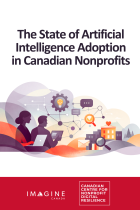
This benchmark report delves into AI adoption by nonprofits in Canada, exploring what they’re using it for, what’s holding them back, and what responsible AI use can look like - highlighting both challenges and opportunities.

Practical guidance to help founders and boards work together to strengthen governance, manage transitions, and set nonprofits up for lasting impact.
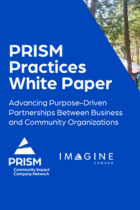
Practical guidance to help companies form stronger, trust-based partnerships with nonprofits that strengthen communities, advance corporate goals, and drive meaningful social impact.
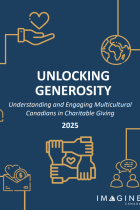
This study provides practical insights to help organizations build stronger connections with some of Canada’s fastest-growing populations.
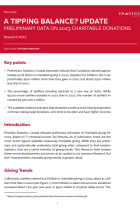
This Research Note looks at the latest data on charitable giving from Statistics Canada, based on 2023 T1 personal income tax returns. These preliminary estimates, while understating total giving compared to final tax statistics, are a useful indicator of current trends. This Research Note highlights recent developments and provides an update to the Research Bulletin ‘A Tipping Balance?: Trends in Charitable Donations 1997–2022’, which explores donation trends in more depth.

What do we know about the millions of people working in Canada’s nonprofit sector? This report provides a detailed profile of these workers, including demographic and salary information, and uncovers how the nonprofit workforce differs significantly from the broader Canadian labour force.

Nonprofits play a key role in fostering digital inclusivity and supporting equity-seeking communities, making their involvement vital to achieving a more equitable digital future. This report explores the complexities of digital inequity and provides nonprofit organizations with insights on how they can bridge the gap.

Trends in charitable giving have evolved over the past 25 years, reshaping the philanthropic landscape of Canada. This research bulletin examines shifts in donation patterns, revealing a growing reliance on high-value donors and an ongoing decline of tax filers claiming donations. Drawing on data from Statistics Canada and the Canada Revenue Agency, the report also reviews the key demographic drivers of these trends and their increasing impact on charities.

While many nonprofits are actively addressing cybersecurity risks, many are not. This report published by the Canadian Centre for Nonprofit Digital Resilience explores some of the key challenges nonprofits face in addressing cybersecurity risks and introduces a five-step cybersecurity on-ramp developed to help settlement organizations as well as other types of nonprofits take initial steps to strengthen their cybersecurity and mitigate critical cyber risks. It also includes key resources that are useful starting points for organizations when considering cybersecurity.

This first of its kind study explores nonprofit perceptions and expectations related to corporate social impact and community partnerships. Findings drawn from a survey of over 900 individuals provide a unique opportunity for nonprofit organizations to share candid views on corporate practices, partnerships, and aspirations for the future. In addition, the report highlights corporate leaders in social impact and nonprofit partnership, as well as best practice recommendations.
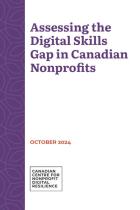
This research project - a collaboration between Imagine Canada, Blueprint ADE, The Dais, and Digital Governance Council - explores the current state of the nonprofit workforce, demand for digital skills as well as gaps, challenges and opportunities to inform the design of solutions that aim to bolster digital skills within nonprofits to enhance organizational effectiveness. Reports from this project are published by the Canadian Centre for Nonprofit Digital Resilience.

Social finance offers enormous potential to help nonprofit organizations address social issues. This report sheds light on the social finance ecosystem in Canada and highlights the importance of advancing it through a collaborative and inclusive approach. Read the report to understand the enablers and barriers, and to explore - through real-life examples - how and why social purpose organizations engage in social finance.

Charities and nonprofits address society's most challenging issues, requiring innovation and systemic change. Universities can be valuable partners in this pursuit, with many successful campus-community collaborations. However, these partnerships often prioritize academic interests over community needs. This report examines the social sector's innovation capacity and argues for more balanced, reciprocal partnerships to drive genuine innovation and systems change.

The first comprehensive study to explore what Canadian charities and nonprofits are doing to advance EDI within their organizations. This study provides key insights into the nonprofit sector’s commitment to EDI through an exploration of the topics: how organizations are integrating EDI into their work; the role of equity working groups in advancing EDI; the factors that enable and hinder organizations as they seek to apply EDI principles; and the role of governance and operational leadership in moving this work forward.

From the Mind to the Heart, a two-part research series conducted by AgentsC Inc. and Imagine Canada, explores the influence of justice, access, inclusion, diversity, equity (JAIDE) within the corporate community investment profession, and the beliefs, culture, and practices that inhibit or enable equity within corporate nonprofit partnerships. Findings are drawn from a survey of Canada’s largest companies, interviews with diverse professionals, and discussions with young leaders.

Launched by Volunteer Canada, in partnership with Imagine Canada, Ajah, Association of Fundraising Professionals of Canada, and Volunteer Management Professionals of Canada, this new hub highlights key data sources on giving and volunteering, including Statistics Canada’s General Social Survey on Giving, Volunteering and Participating (GSS-GVP). Access a wide range of useful insights including key trends to help better understand the nature of giving and volunteering in Canada.
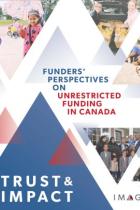
Removing restrictions on funding enables charities and nonprofits to be more efficient, which in turn results in more resilient organizations and a greater impact on communities. The pandemic saw a number of foundations and corporate funders across Canada adapt their practices to allow for more flexibility. This new study sheds light on the lessons learned and encourages more funders to think differently by evolving their funding models.
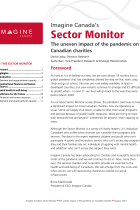
Mirroring what is observed in the economy as a whole, the COVID-19 pandemic is impacting the charitable sector unevenly. Over a year since the beginning of the crisis, more than half of charities continue to struggle while others are doing better. From drastic revenue declines to demand surpassing capacity, the situation is still precarious for many organizations, which could have an important impact on the communities they serve. Read our third Sector Monitor Survey to learn more.
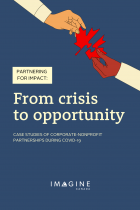
The time is ripe for companies and organizations to re-examine how they operate and how they collaborate. Partnering for Impact: From Crisis to Opportunity presents case studies of nine compelling partnerships.
How have these partnerships leveraged innovation and technology to scale impact? How do long-term funding commitments drive change? Download the report to find out.
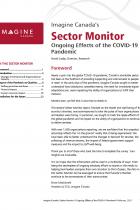
Nearly a year after the COVID-19 pandemic began, with a crisis that continues to dramatically shape how charities operate, this report focuses on the health and well-being of the country’s charities, tracking the ripple effects of the global pandemic and its impact on the ability of organizations to continue to deliver services.

2020 has been a year of unprecedented challenges, and the role of business in our communities has never been more important. How can these companies help to build back better? Our latest report answers this and more.

This national study -- one of the first in Canada to explore the influence of ethnicity on supporting charities -- offers a glimpse into the enormous giving potential that resides with newcomers to Canada and second-generation Canadians.
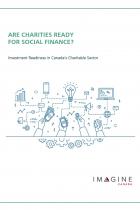
Investment Readiness in Canada’s Charitable Sector. What are the challenges and opportunities that social finance presents for the charitable sector? Find out in our latest report.
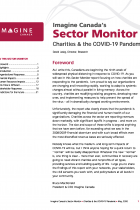
How has COVID-19 impacted the charitable sector? Since the onset of the COVID-19 pandemic, charities have had to navigate through the impact of physical distancing, mandatory closure of non-essential businesses, and myriad other changes to the operating environment. This report draws on historical Sector Monitor findings from the aftermath of the 2008/09 downturn to provide additional context.

Profit, Purpose and Talent: Trends and Motivations in Corporate Giving and Volunteering shows that employees value the community contributions of their employers, and that high levels of community engagement lead to long-term business advantages for corporations.

Take an in-depth look at the giving behaviour of Canadians in this new report – who gives, how and why – and how these trends are re-shaping the future of philanthropy in Canada.

As a follow up to his Charities, Sustainable Funding and Smart Growth discussion paper, Chief Economist Brian Emmett presents a strategic architecture for government and the charitable and nonprofit sector to address the looming social deficit in Canada.

Through a series of scenarios that project the state of the charitable and nonprofit sector in 2026, chief economist Brian Emmett identifies a looming social deficit.
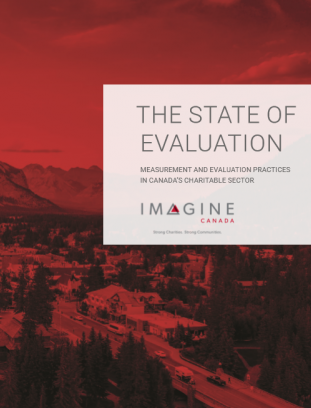
The State of Evaluation
This national report provides the first comprehensive look at how Canadian charities are measuring and evaluating their work, how they are talking with their funders about evaluation, and what enablers and barriers they are facing.
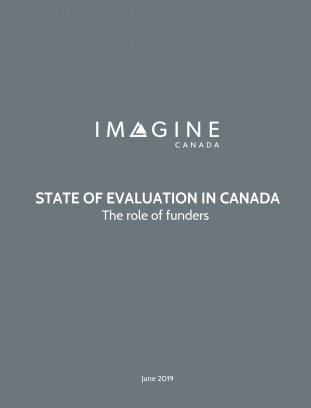
State of Evaluation in Canada: The Role of Funders
How does dedicated evaluation funding impact charities? The relationship between funders and funded charities is central to evaluation practice and norms, but what are the implications of funders requirements? How do they help charities further their missions?
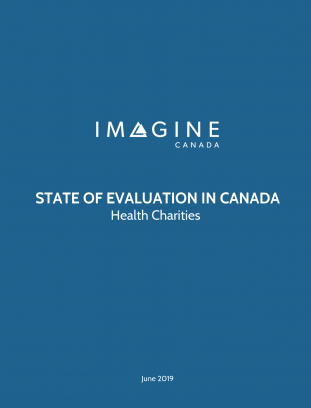
State of Evaluation in Canada: Health Charities
How do health charities measure up? A report that highlights how these specific types of organizations evaluate and measure their work compared to other subsectors.
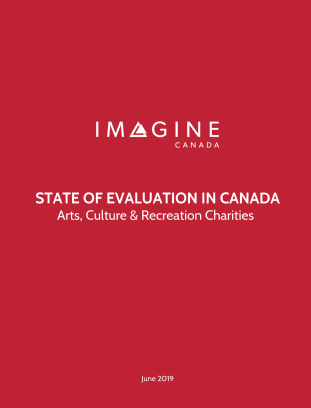
State of Evaluation in Canada: Arts, Culture and Recreation charities
How do arts, culture and recreation charities measure up? A report that highlights how these specific types of organizations evaluate and measure their work compared to other subsectors.
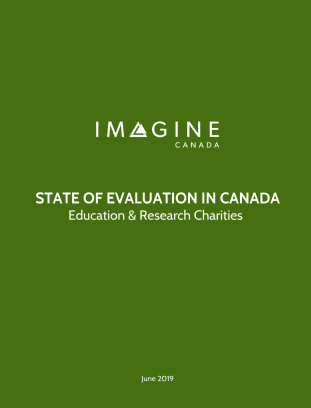
State of Evaluation in Canada: Education and Research charities
How do education and research charities measure up? A report that highlights how these specific types of organizations evaluate and measure their work compared to other subsectors.
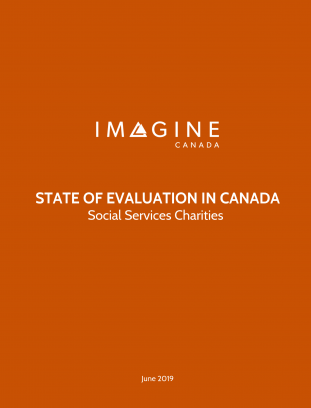
State of Evaluation in Canada: Social Services Charities
How do social services charities measure up? A report that highlights how these specific types of organizations evaluate and measure their work compared to other subsectors.
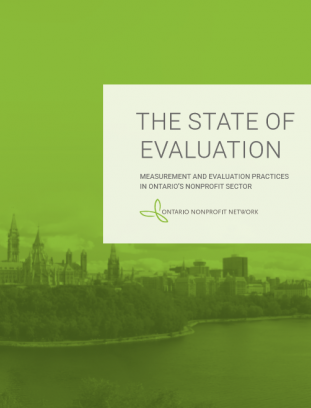
The State of Evaluation in Ontario
An Ontario-specific report that looks at what is being evaluated and measured by Ontario nonprofits and charities and the role and influence of funders on measurement and evaluation.
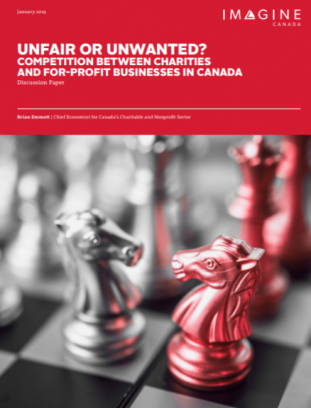
Unfair or Unwanted? Competition Between Charities and Nonprofit Businesses in Canada
As Canadian charities face a long-term crisis of financial sustainability, they are looking at ways to increase earned income. At the same time, for-profit businesses have become more active in areas once thought to be the unique domain of charities.

Young People & Nonprofit Work
Through a series of interviews with young workers, we gained insights into the experiences, aspirations and challenges these individuals face as they explore a career in the nonprofit sector.
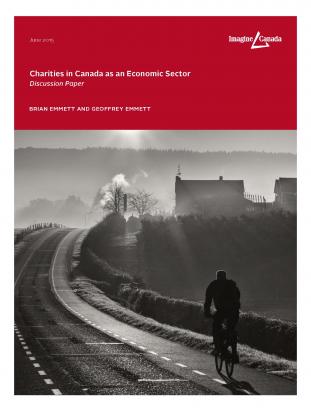
Charities in Canada as an Economic Sector
The discussion paper, by Chief Economist Brian Emmett and co-author Geoffrey Emmett, invites Canadians, governments, businesses and communities to not only think of charities as purpose driven but also as an essential component driving Canada’s economy.

Tax Incentives for Charitable Donations in Canada with a Focus on the Stretch Tax Credit for Charitable Giving
Brian Emmett, our Chief Economist, and Harvey Sims, the former Chief Economist, Privy Council Office for the Government of Canada and Ottawa-based consultant, co-authored a discussion paper about the tax incentives for charitable giving in Canada paying particular attention to the proposed Stretch Tax Credit.